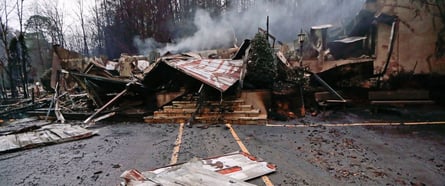The importance of packing a "paralysis go bag" - Blog - Reeve Foundation
Emergency Preparedness is a subject that is relevant and discussed several times throughout the year, as there are different risks during different seasons. Unfortunately, too many people don't take the time or minimal effort to become prepared prior to an emergency. This past few weeks included many examples of the types of events that require us to be prepared.
Earthquakes and flooding around the globe required many people to evacuate and find shelter elsewhere when their homes or communities were destroyed.
In many of these disasters, people were unprepared for such unexpected emergencies. Examples of that were plentiful during media interviews in shelters after the Tennessee towns of Gatlinburg and Pigeon Forge burned at the end of November. Many victims had mere minutes to evacuate, escaping with only the clothes they were wearing at the time. Those interviewed were not bemoaning the loss of their property, despite the destruction of over 700 structures; they were simply thankful that they and their family members were able to escape.
Those of us who are paralyzed and require the use of mobility devices or specialized transportation, perhaps public transportation, may not be able to move out of the area as quickly when an evacuation notice is issued. We are at increased risk, but can reduce that risk by being fully prepared to shelter in place or to evacuate early if an emergency situation appears likely to require an evacuation.
The Federal Emergency Management Agency (FEMA) has compiled a list of items that are considered to be a necessary part of each household's Basic Disaster Supplies kit. The availability of these items can make it possible to shelter in place for several days in the event of emergencies that make it impossible to leave the home. Prolonged power outages, loss of water supply or road closures due to flooding or snow are just a few examples of what might make sheltering in place necessary.
For people who are paralyzed, some additional items that are not on the FEMA list should be added. These and other critical items that might be needed after evacuating should be stored in a "go bag" that is immediately available whenever we must leave our homes in an emergency. As an example, my go bag is stored in the entryway closet in a red duffel bag so that it will be more visible when leaving the home in an emergency. There may not be time to search through supplies to assemble the contents of a go bag that would be useful during several days in a shelter.
 Depending on the type and level of disability, the contents of a paralysis go bag might include preferred types of urological supplies (such as catheters or drain bags), a week's worth of medications, copies of all prescriptions, lists containing important phone numbers and Internet passwords. Be sure to include copies of insurance cards and other important identification--such as a social security card or a passport--that might be needed during evacuation or at a shelter. Besides assuring that your immediate needs are met in an emergency shelter, these items will prove to be exceptionally useful if the absence from the home is for a longer term.
Depending on the type and level of disability, the contents of a paralysis go bag might include preferred types of urological supplies (such as catheters or drain bags), a week's worth of medications, copies of all prescriptions, lists containing important phone numbers and Internet passwords. Be sure to include copies of insurance cards and other important identification--such as a social security card or a passport--that might be needed during evacuation or at a shelter. Besides assuring that your immediate needs are met in an emergency shelter, these items will prove to be exceptionally useful if the absence from the home is for a longer term.
If the mobility device in use is battery powered, keep a backup battery charger with the go bag for use after evacuation. Check with a local wheelchair vendor if none is immediately available to see if they can give you a used one for use in emergencies. If no extra charger is available for a cellular phone or tablet, consider purchasing one of the small backup battery devices that can be pre-charged for use when a phone battery goes dead.
For those wanting to do even more to prepare for emergencies that might involve evacuation, consider assuring that local shelters will be prepared for us and our peers in the event of a real emergency by offering to check out their accessibility at a time when no emergency exists and offer to participate in mock drills. Play a leadership role by encouraging family, friends and neighbors to become more fully prepared so that minimal special effort needs to be made for us to be rescued during a future emergency; this may be as simple as lining up assistance for evacuation in advance, or making sure pets and service animals are included in the planning.
Following these recommendations will not keep disasters from occurring, but should help assure that we are all as prepared as possible when they do occur.
Michael Collins is a past chair of the Disability Advisory Group of the National Fire Protection Association (nfpa.org) and the author of the California State Independent Living Council's 2003 report to the legislature on the Impact of California Wildfires on People with Disabilities.
© 2016 Michael Collins
Join Our Movement
What started as an idea has become a national movement. With your support, we can influence policy and inspire lasting change.
Become an Advocate